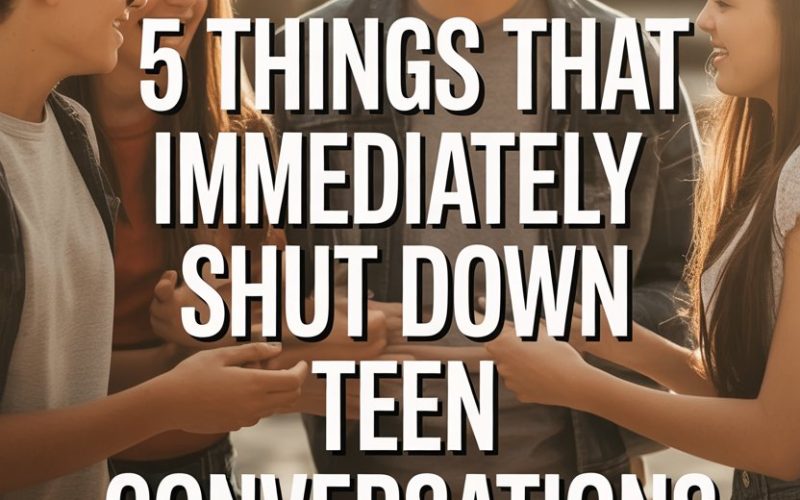Ah, the teenage years. That magical time when your once-chatty child transforms into a mysterious creature fluent in monosyllables and exasperated sighs.
If you’re a parent, you know the struggle: you want to stay connected, but every chat feels like defusing a bomb with oven mitts on. Spoiler alert—some conversational landmines are almost guaranteed to end things before they begin.
Let’s pull back the curtain on five of the biggest conversation killers (and how to avoid them, even when you’re running on fumes and caffeine).
1. The Interrogation Trap
Picture this: You spot your teen slinking through the front door, and out it comes—“Where have you been? Who was there? What did you do? Was Jamie there? Did you wear your coat?”
It’s classic detective work, but to a teenager, it feels less like caring and more like being grilled by airport security.
The urge comes from a good place—you just want to know what’s happening in their world. Problem is, rapid-fire questions can feel accusatory, even if you’re genuinely curious.
According to psychologist Dr. Lisa Damour, teens crave autonomy and will shut down if they sense an inquisition.
Try swapping the Spanish Inquisition routine for genuine curiosity. A simple, “How was your evening?” or “Anything interesting happen at the skate park?” works wonders.
Show you care, but give them room to decide how much to share. Sometimes less really is more.
2. The Lecture Launch
Somewhere in the Parenting Handbook (page 47, probably), it says, “When your teen opens up, deliver a 20-minute TED Talk about life lessons.”
The intention? Wisdom bestowed. The result? Eyes glazed over, phone checked under the table, existential regret.
When teens finally share something, launching into a lecture sends a clear signal: “I’m not really listening—I’m preparing my PowerPoint.”
According to child development expert Dr. Michael Thompson, teens are allergic to monologues, especially those delivered with a side of “When I was your age…”
Next time, bite your tongue. Instead of unleashing your inner professor, try echoing what they’ve said, or just nod and listen.
You can always revisit the topic later, once the initial sharing moment has passed and you’re no longer at risk of being tuned out entirely.
3. The “It’s Not a Big Deal” Dismissal
A friend ghosting them. Flunking a test. Zits that might as well have their own postcode. Teenage problems can seem trivial to a parent’s grown-up brain, but for your child, these are real, throbbing headaches.
Minimising their troubles—“You’ll laugh about this in a few years!” or “Wait till you’re paying a mortgage!”—doesn’t put things in perspective; it makes them feel silly for caring.
This is a surefire way to get the classic “nothing’s wrong” answer next time you ask.
Empathy is your best friend here. You don’t have to pretend you loved every zit or heartbreak from your own youth, but acknowledging their feelings (“That sounds rough. Want to talk about it?”) validates their emotional world.
As Harvard’s Center on the Developing Child highlights, teens are in the thick of emotional rewiring. A little compassion goes a long way.
4. The “You’re Overreacting” Reflex
Some days, the drama is dialed up to 11. Maybe your teen slams the bedroom door because someone wore the same shoes as them at school. Maybe they’re devastated because their favourite show got cancelled.
You’re barely suppressing a laugh, but you tell them to “calm down” or, worse, “stop being so dramatic.”
Congratulations, you’ve just won the Fastest Conversation Shutdown award.
Brushing off their reaction doesn’t make the feelings disappear. It just tells your teen they’re not safe sharing with you.
According to clinical psychologist Dr. Lisa Coyne, validation is the secret ingredient that keeps conversation flowing—even if all you say is, “Sounds like that really upset you.”
If you must gently nudge things toward perspective, try “That sounds like a lot. Want to vent, or are you looking for advice?” Sometimes, just recognising the emotion is all it takes.
5. The Instant Fix-It Mode
You see a problem. Your parent-brain goes into superhero mode—solutions at the ready, cape flapping. Whether it’s a friendship fallout or a disastrous haircut, you want to swoop in and solve it all.
But here’s the plot twist: Teens often just want to feel heard.
Launching immediately into “Here’s what you need to do…” can make them feel like their struggles are too much for you to handle, or that you don’t trust them to figure things out.
In her research on supportive parenting, Dr. Laura Markham points out that problem-solving is usually step three, not step one. Listen. Empathise. Ask if they want help before offering suggestions.
Most of the time, they just want to vent, not be issued a battle plan.
Keeping your fix-it cape tucked away signals trust in their ability to cope—and opens the door for deeper conversations down the line.
Breaking the Silence, One Conversation at a Time
Every parent wants a healthy connection with their teenager. The trick isn’t in crafting the perfect words or knowing every new slang (though bonus points if you can use “slay” correctly).
It’s about being present, staying curious, and resisting the urge to steer the ship every time your teen lets you peek below deck.
Instead of peppering them with questions, springing into lecture mode, or denying the reality of their rollercoaster feelings, aim for empathy and listening. Yes, you’ll stumble. Sometimes you’ll get an eye-roll or a grunt.
But with a bit of patience and a willingness to try again tomorrow, you just might find your way back into those precious conversations—awkward silences and all.
Now, go forth and try nodding instead of narrating. You might even get more than a one-word answer.
Stranger things have happened.




